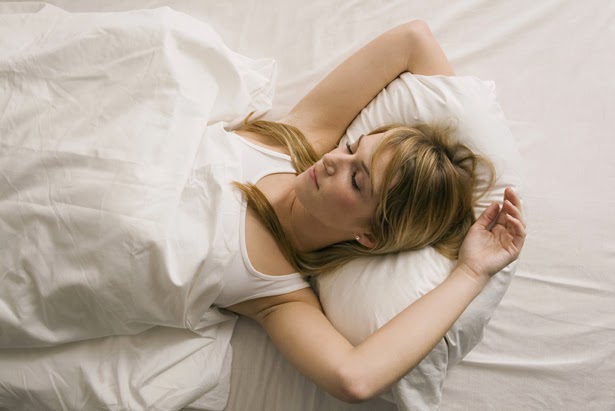Stylist.com has given us a great advice on skin care - from face to toes, plus it will help your hair and nails as well. So enjoy the article and start doing it now while it's summer in the air ;)
We're at a constant battle to keep our skin, hair and nails looking healthy.
But before you rub your face in moisturiser, before you endure a drastic chop at the hairdressers and before you buy that new beauty product, take a look at these simple and easy ways to maintain or improve your natural beauty.
From eating more tomatoes for sun protection to sleeping on your back, these ten changes have been scientifically proven to make skin, hair and nail conditions better. And the best thing is, they can be slipped into your current beauty routine...
Moisturize within three minutes of turning off the water
Contrary to popular belief, moisturiser does not add moisture to the skin. It traps existing water in the skin by preventing it from evaporating. To capture the most amount of moisture from your bath or shower, moisturise within three minutes of bathing according to the American Academy of Dermatology.
If you're washing your face at the sink, apply the moisturiser immediately after you've cleansed and patted dry your face, recommends Dr. Doris Day, and author of Forget the Facelift: Dr. Day Turns Back the Clock with a Revolutionary Program for Ageless Skin.
The fact is that skin is an organ, which without water does not function properly or at its best. Even if you drink plenty of water, physicians at the University of Wisconsin Hospitals say the unfortunate truth is that water will reach all the other organs before it reaches the skin. So, it's important to apply water to our skin and keep it there.
Wash your face once a day (preferably at night)
Unless you have a skin condition, such as acne, dermatologists say you only need to wash your face once a day, in the evening. Night-time cleaning removes make-up, pollutants and other first that has collected on the skin.
"Your skin has just slept on a pillow, it is clean (in the morning), it doesn't necessarily need to be washed," said Gervaise Gerstner, a Manhattan dermatologist and consultant for L'Oréal Paris.
However to feel fresh in the morning, people without a serious skin-care issue can skip the soap and just rinse their faces.
Add virgin coconut oil to your moisturizing routine
While celebrities such as Emma Stone and Gwyneth Paltrow are said to use oils to hydrate their skin, vigin coconut oil is proven to better skin condition.
A recent study in the International Journal of Dermatology showed that topical virgin coconut oil decreased water loss in the skin of people with atopic dermatitis, an inflammatory condition where the skin’s natural moisture-locking barrier isn’t working well.
No matter what condition your skin is in, "Research demonstrates how good virgin coconut oil is as a moisturizer," says study author Mara Evangelista. "It’s affordable, effective, and especially helpful for the older population, when skin dryness is a pressing problem."
Coconut oil can also be very protective against hair damage because it has a high affinity for hair proteins and, because of its low molecular weight, it is able to penetrate inside the hair shaft.
Buy virgin organic coconut oil for £3.95 at handmadenaturals.co.uk
Exercise regularly to cleanse skin from the inside
While we all know the muscle and cardiovascular benefits of exercise, its a lesser known fact that physical activity also helps keep your skin healthy and vibrant by increasing blood flow.
"Blood carries oxygen and nutrients to working cells throughout the body, including the skin," says dermatologist Ellen Marmur, author of Simple Skin Beauty: Every Woman's Guide to a Lifetime of Healthy, Gorgeous Skin. Blood flow helps carry away waste products, including free radicals, from working cells. "By increasing blood flow, a bout of exercise helps flush cellular debris out of the system," added Marmur.
A recent study by researchers at McMaster University in Ontario suggests regular physical activity can even reverse skin ageing in those who start exercising late in life. When a group of volunteers aged 65 or older started jogging or cycling at a moderately strenuous pace for 30 minutes twice a week over three months, researchers found the outer and inner layers of their skin looked very similar to those of 20- to 40-year-old. (Note, researchers studied skin samples from the volunteers' buttocks to ensure it was an area of skin not frequently exposed to the sun.)
“I don’t want to over-hype the results, but, really, it was pretty remarkable to see," said Dr. Tarnopolsky. Under a microscope, the volunteers’ skin "looked like that of a much younger person, and all that they had done differently was exercise."
However, try to avoid excising outdoors between 10am and 4pm when the sun is at its peak. "The main danger if you exercise outdoors is sun exposure," says April Armstrong, assistant professor of dermatology at the University of California. Sunburns increase skin cancer risk and rapidly age the skin.
Sleep on your back
Burying our faces into our pillows can cause dark circles and puffiness in our eyes.
"If you sleep face-down the blood vessels will become constricted and the circulatory system releases congested fluid from tiny flaps in the walls of these vessels," says Colette Haydon, a doctor of pharmacy and dermo-cosmetology at University of Lyon, France.
"The dark circles are actually tiny blood vessels ‘pooling’ under the thin, delicate skin below the eyes. The older you get, the longer they take to disappear; and you may notice more lines forming permanently on the side of the face you normally sleep on," added Haydon. "This is because as we age, our skin loses elasticity and collagen, and doesn't ‘bounce back’ into shape."
The answer is to train yourself to sleep on your back and keep your head raised well above your body in bed b using two pillows.
Sleep for at least seven hours
Most people have experienced sallow skin and puffy eyes after a few nights of missed sleep, but it appears there's concrete evidence to prove beauty sleep is a real thing.
A study released last year by University Hospitals Case Medical Center in Cleveland, Ohio, and Estée Lauder Companies Inc. showed that people who don’t get enough sleep at night are more likely to have poorer skin health and skin that ages up to 50% more quickly.
Poor sleepers had significantly higher ratings of fine lines, uneven pigmentation and slackening elasticity. Compared with the good sleepers (women who had slept more than seven hours a night for at least a month), poor sleepers (women who had gotten fewer than five hours of sleep each night for at least a month) had significantly higher ratings of fine lines, uneven pigmentation, slackening elasticity and exhibited impaired skin-barrier function, increased moisture loss and slower recovery from sunburn.
Feast on tomato-based food in the summer
It's time to eat more pizza and pasta. A pigment called lycopene in tomatoes has been found to significantly protect skin from UV damage.
In the 2012 study led by Newcastle University, one study, 23 women who were used to burning merely at the sight of the sun ate 55g of tomato paste every day for 12 weeks. When they were exposed to UV radiation they showed 33% more skin protection. Scientists said the tomato paste acted as an equivalent to a sunscreen with a sun protection factor (SPF) of 1.3.
"Eating tomatoes will not make you invincible in the sun, but it may be a useful addition to sun protection along with sunscreens, shade and clothing," said professor Mark Birch-Machin, lead author of the study, in a statement.
Having a diet rich in tomatoes is, "likely to contribute to improved skin health, which in turn may have an anti-ageing effect," added Birch-Machin. According to the BBC, 85% of lycopene in the western diet is obtained only from tomatoes and it's best found in cooked tomato paste or sauce because that's when lycopene is digestible.
Eat vegetables for better skin tone
Recent studies have shown that a diet with more fruits and vegetables can change and improve skin tone.
"Most people think the best way to improve skin colour is to get a suntan, but our research shows that eating lots of fruit and vegetables is actually more effective," said Dr Stephen whose 2011 study at University of Nottingham found that people who eat more portions of fruit and vegetables per day had a more golden skin colour, thanks to substances called carotenoids which gives natural produce its pigmentation
In 2012, researchers at University of St. Andrews School of Psychology tracked the fruit and vegetable consumption of 35 people over a six-week period and saw an increase in red and yellow tones in participants' skin.
The researchers also credited the changes in skin colour to carotenoids, such as beta-carotene, which gives carrots their orange colour and is also found in yams, peaches, pumpkin, apricots and spinach; and lycopene which gives peppers, tomatoes, watermelon, apricots and pink grapefruits a reddish hue.
"Our study suggests that an increase in fruit and veggie consumption of around three portions, sustained over a six-week period, is sufficient to convey perceptible improvements in the apparent healthiness and attractiveness of facial skin," said lead researcher Dr. Ross Whitehead. “Conversely, those [participants] that worsened their diet became paler."
Introduce yourself to silica
You've probably never heard of an element called silica but it works wonders for our skin hair and nails and is is the second most prevalent element after oxygen. When you're young, your body has abundant levels of silica which is why children normally have beautiful silky hair, soft skin and perfect nails. We are born with large amounts of silica but we lose it with age.
A study by the University of Cincinnati’s College of Pharmacy found that fine-haired women who were given 10 mg of silica per day for nine months had thicker hair, increased elasticity and better tensile strength. Another study executed by the Department of Dermatology at the University of Bologna found that women taking silica over a 20-week period had less-brittle nails and hair and decreased skin roughness.
Since the amount of silica found in food today is very low, because it is usually found in the skin or outer layers of food and is removed during processing, we need to be aware of the foods with the highest amount of silica, such as
bananas (yellow, peeled), beer, high bran cereal, wholegrain bread, raisins, cooked green beans, peeled raw carrots, brown rice and certain mineral waters such as Fiji brand water.
Cover your hair in the sun
UV radiation from the sun is responsible for damaging the internal protein structure of hair and can eventually weaken it. As with skin, the lighter the colour of your hair, the more affected it will be, as Melanin in hair serves as a protective barrier from sun damage.
If you happen to live in or holiday at a place with strong sunshine and you intend to be outdoors for an extended period, wear a hat or scarf to protect your hair from UV damage and the associated loss in strength. Sunscreen is just as effective on skin as it is on hair too.
(Words: Sejal Kapadia, Image: Rex Features)
xo K











